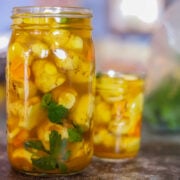Pickled Jerusalem Artichokes
Crunchy and sweet, sunchokes are perfect in this pickled sunchokes recipe.
Servings: 16 servings
Calories: 41kcal
Equipment
Ingredients
Brine
- 2 quarts water (divided)
- ½ cup sea salt (divided)
Other Ingredients
- 2 pounds sunchokes/Jerusalem artichokes (cleaned, cut into chunks)
- 1½ cups apple cider vinegar
- 1½ cups distilled white vinegar
- 3 cloves garlic (sliced)
- ¼ cup Italian parsley
- 1 tablespoon hot curry (mild may be used)
- 1 habanero or serrano pepper (optional)
Instructions
- Thoroughly clean Jerusalem artichokes to remove all the soil. Trim any dark spots, or knots and peel, as necessary. Cut into 1"-2" chunks
- Stir half of the salt into a quart of cold water, until dissolved. Place artichokes in a clean, sterilized jar. Cover with the brine solution. Leave the lid untightened to allow the gases to escape.
- Place the bottle in a dark location for one week. Check the bottled Jerusalme artichokes after three days.
- When the brine gets murky and gases float to the surface, drain the old brine and make a new batch using the remaining salt. Soak the artichokes in the new brine for four more days.
- Once the Jerusalem artichokes have been brining for at least one week, remove them from the brine and rinse them off with fresh, cold water.
- Place vinegar in a saucepan and bring to a boil. Remove from heat and stir curry into the vinegar until combined.
- Allow the vinegar to cool slightly, then add artichokes, garlic, parsley, and habanero pepper (if using). Add to sterilized jars and store in the refrigerator.
- The pickled artichokes will be ready to eat after three days, but will taste better the longer they’re allowed to pickle.
Video
Notes
- Never tighten the jar lid during the brining process, the bottle can burst as a result of the gases being released from the sunchokes.
- Pickled sunchokes will be ready to eat in as little as three days after pickling them in the vinegar solution. However, the longer they pickle the more flavor they will absorb.
- If you prefer canning the pickles instead of storing them in the refrigerator, be sure to pack the sunchokes in jars that have been properly sterilized. Boil sealed jars in a water bath for at least five minutes before storing them in a cool, dark location.
- If you find the pickling solution too strong, you can replace some of the vinegar with salted water. Use the ratio found in my pickled carrots recipe.
- Plastic or glass containers are perfect for storing pickles. For longer, unrefrigerated storage, use the following sterilization/canning directions.
Nutrition
Serving: 2oz | Calories: 41kcal | Carbohydrates: 10.99g | Protein: 1.13g | Fat: 0.01g | Sodium: 880.24mg | Fiber: 0.91g | Sugar: 5.92g
